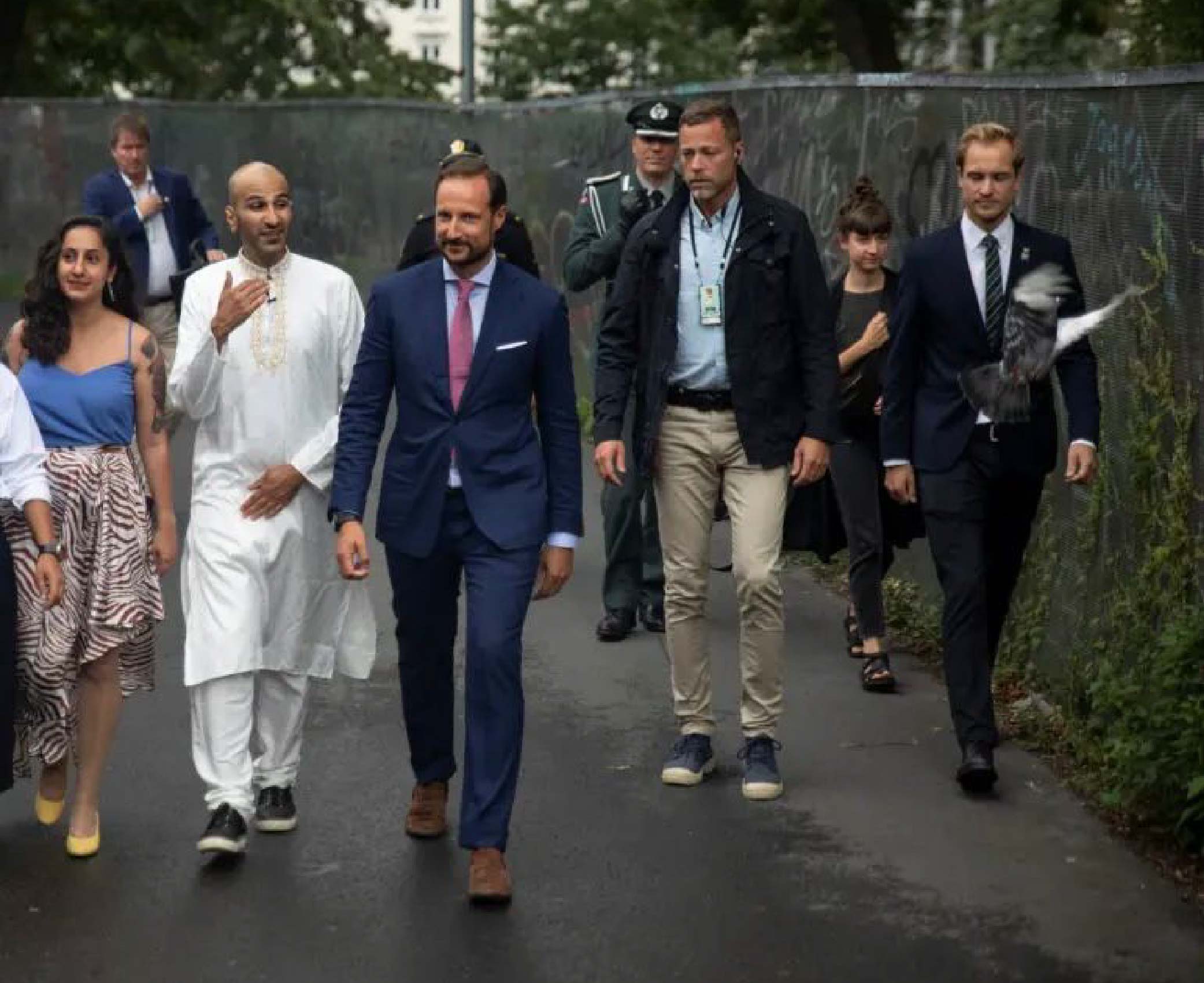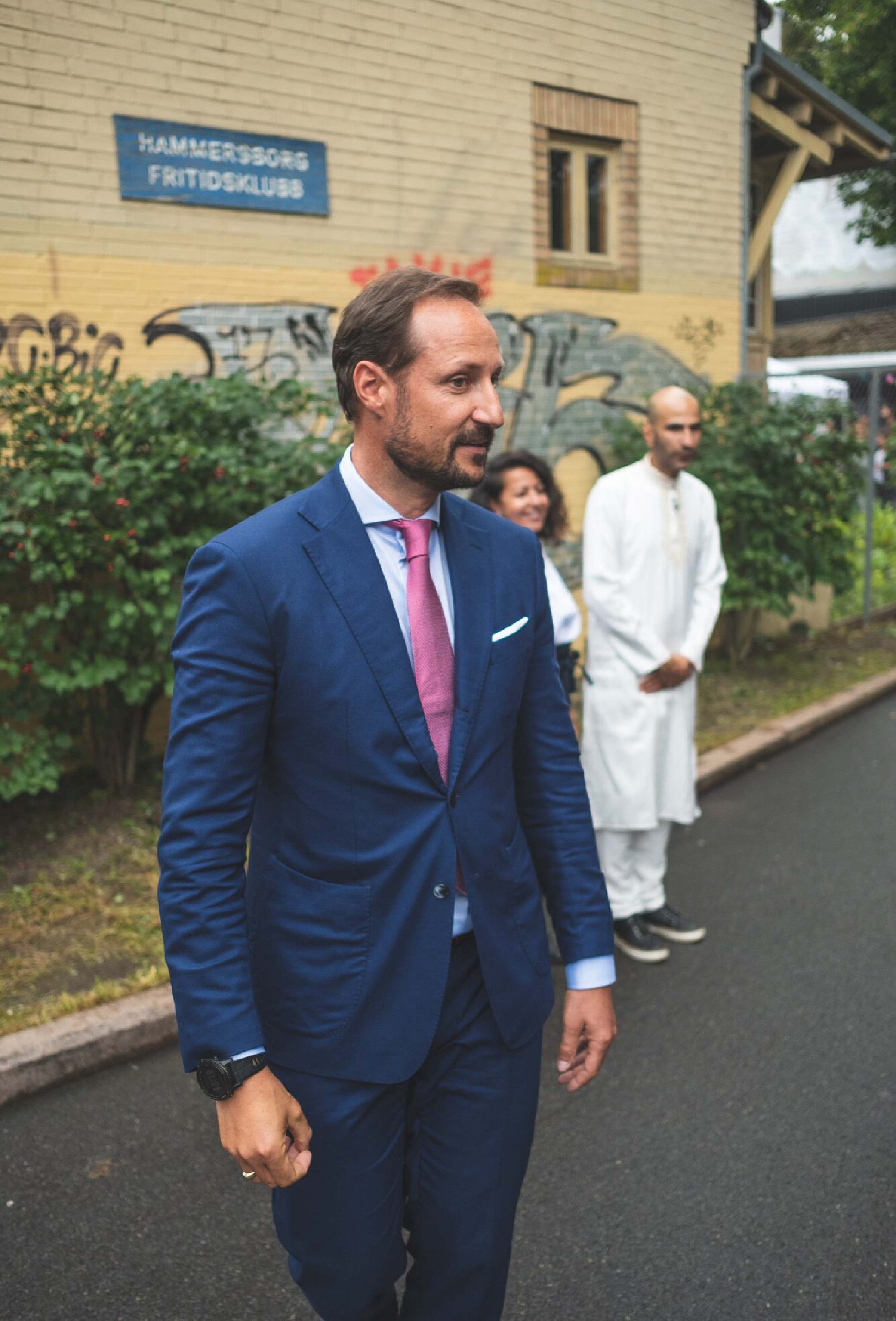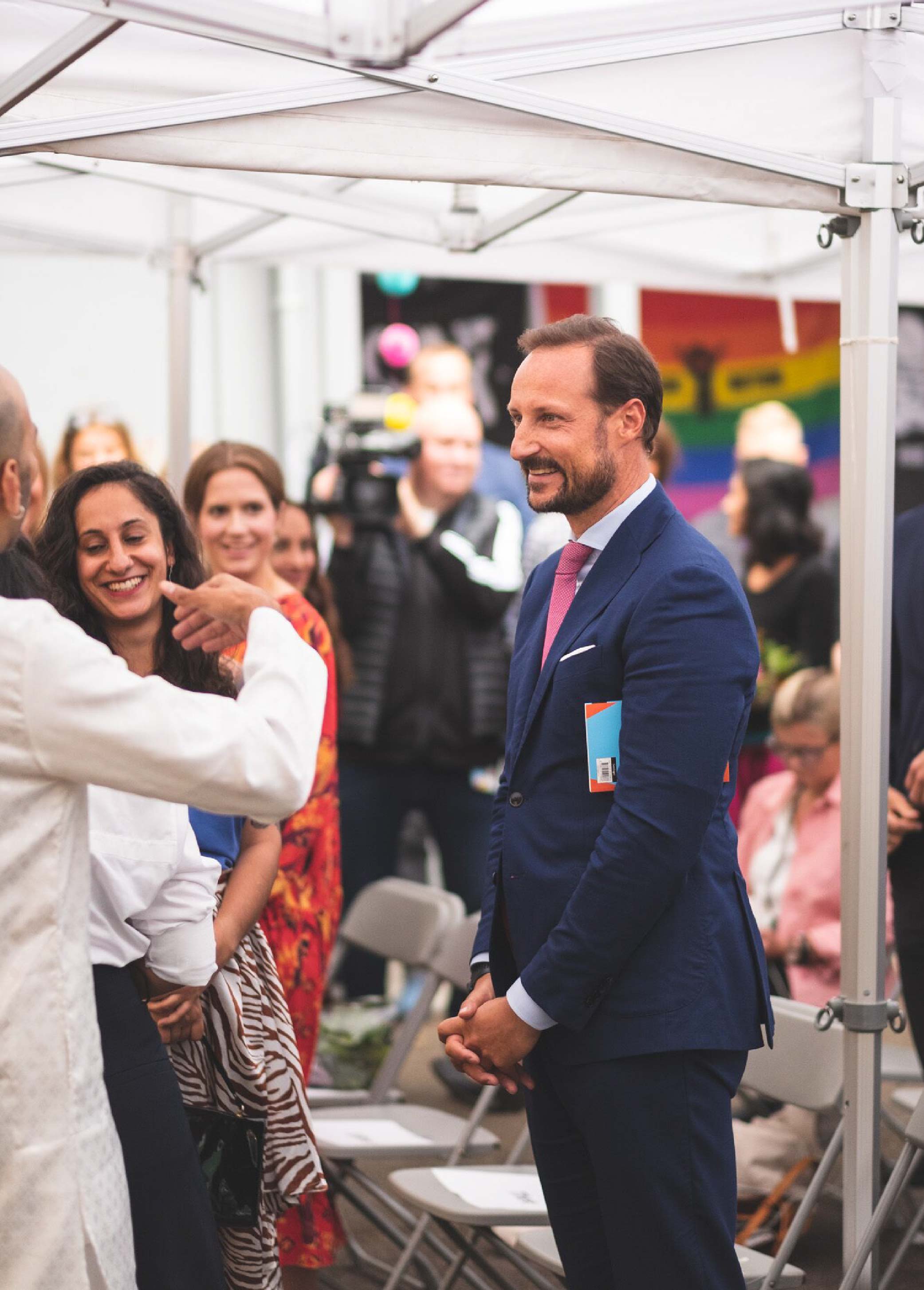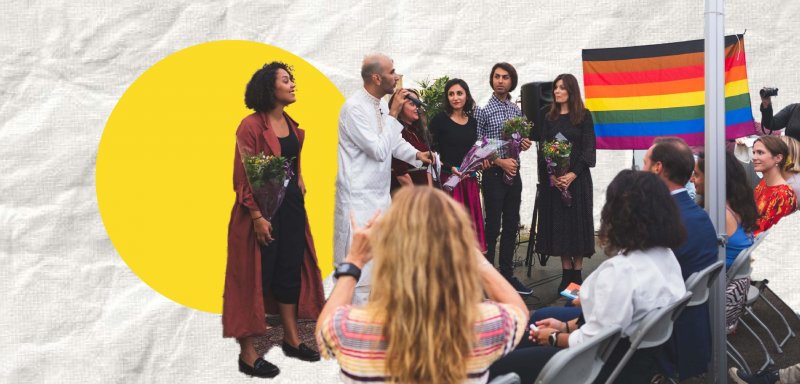Colored Stories: A dedicated space for vibrant stories belonging to individuals within the LGBTQIA+ community. These are stories of people who have overcome great challenges, shattered taboos, and left a strong mark in the public sphere or in the professional path they chose. Through their perseverance and effort, they have proven that success is not limited to sexual and gender identity, and that dreams are accessible to everyone without exception.
Thee Yezen Al-Obaide is a director and social and political activist of Iraqi descent living in Norway.
He has won international awards for his film The Future of Iraq, and through his work and political activism, he has hosted members of the Norwegian royal family at his organization, Salam.
"I’m tired of politicians’ games"
We had agreed to meet via Zoom, and while I was preparing the link, I received a message from him: "Sorry, I need to go to the police. Can we reschedule for tomorrow?" My curiosity and concern immediately began racing, and it wasn’t until the next day, at our scheduled time, that I could finally relax.
I asked him: "What happened? Are you okay?"
Thee Yezen responded immediately: "I’m tired of the police and politicians' games in Norway."
This sentence piques my curiosity even more, and I barrage him with more questions.
"What do you have to do with the police? Do they often summon you like this? What are they accusing you of?" He explains that this is part of his work with the Salam organization, as whenever there is an attack on a member of the LGBTQIA+ in Norway, the police call the founders of this organization to ask for guidance on how to handle the situation.
I interrupt him: "But they want to build bridges and learn how to find solutions to crimes targeting the LGBTQIA+ community. Isn’t that a positive thing?"
He replies, "This is actually a combination of formalities and deteriorating competency. Protecting LGBTQIA+ individuals is the responsibility of the authorities, politicians, and the police, not the NGOs. NGOs should not be expected to find solutions, or offer advice, or even create political cover to flaunt in front of the media and television. These meetings, often focusing on minority issues, always take place in the presence of politicians and loud media attention, especially when it is assumed that one of the parties involved, either the aggressor or the victim, is an immigrant, Arab, or Muslim. There is no media fuss or emergency meetings when both parties are of European descent, or for example, when the attacker is from the Ukrainian refugee community."
“Protecting LGBTQIA+ individuals is the responsibility of the authorities, politicians, and the police, not the NGOs. NGOs should not be expected to find solutions, or offer advice, or even create political cover to flaunt in front of the media and television.”
Salam says it is “the only LGBTQIA+ organization of its kind dedicated to the Muslim community in Scandinavia.” It works on raising awareness and ensuring a safe and healthy environment for members of this community, particularly those of Islamic heritage who live in Norway.
 Thee Yezen Al-Obaide with Crown Prince Haakon of Norway
Thee Yezen Al-Obaide with Crown Prince Haakon of Norway
Thee Yezen Al-Obaide with Crown Prince Haakon of Norway
Thee Yezen founded the organization with a friend of Kurdish-Iraqi descent seven years ago, an endeavor that changed his life completely. This work forced him to publicly acknowledge his sexual identity and put an end to years of personal tragedy and psychological suffering.
Not only did Thee Yezen suffer from post-traumatic stress disorder (PTSD) due to war and displacement from Iraq, but he also battled depression. "How liberating it is to stop lying! But it turns out that killing fear and accepting oneself comes at a very high price."
Thee Yezen’s mother was invited to a morning gathering of Iraqi women in southern Norway. During their chatter and gossip, the women did not stop at asking about her stance on her son's organization but also delved into his personal life and sexual orientation—of course, with a mix of scorn and contempt.
Since then, communication between mother and son has been severed. And it remains so.
"How liberating it is to stop lying! But it turns out that killing fear and accepting oneself comes at a very high price."
Thee Yezen’s journey of transformation continued, but this time on a personal level. Since childhood in Iraq, he had always felt different from other boys. He didn’t enjoy playing “Cops and Robbers” or war games. Instead, he preferred nurturing games, like playing the roles of a doctor or a teacher. And when he watched The Adventures of Sindbad on television, unlike his male friends who wanted to be Sindbad, he dreamed of being Yasmin.
At the age of eighteen, he arrived in Europe with his family, where he grew up in an open environment. However, he forced himself to deny his desires and the nature of his feelings—until it became unbearable. So, he turned to an unusual and rather fascinating game: he created three identities for himself, depending on the company he was with.
Sometimes, he introduced himself as Thee Yezen, the non-gay young man who opposes Islamophobia and fights the far right in Norway. Among Arabs, he presented himself as "Theon," a gay young man of Indian descent who had been adopted by a Norwegian family—almost as if trying to protect himself from the homophobia that specifically targets Arabs while shielding other minorities from its cruelty. Among Europeans, he took on a third identity: "Yosti," a Jewish man of Iraqi origin living in occupied Palestine.
This game helped Thee Yezen understand the relational dynamics of society, but soon, it became a burden. Friends started to cross paths, and information began to conflict. Once again, he crashed into his wall of lies—until he decided to break through it, coming out as gay and leaving all his fabricated identities behind.
“The meetings focusing on minority issues always take place in the presence of politicians and loud media attention, especially when it is assumed that one of the parties involved is an immigrant, Arab, or Muslim. There is no media fuss or emergency meetings when both parties are of European descent, or for example, when the attacker is from the Ukrainian refugee community.”
However, through the persona of "Yosti," Thee Yezen delved into the history of Iraqi Jews, who had faced threats, killings, and displacement. This gave him a different perspective on anti-Semitism and allowed him to empathize with Arab Iraqis who defend Palestine.
He became deeply interested in the topic and wanted to explore it further by making a documentary about Iraqi Jews currently living in Palestine, many of whom now unfortunately lean toward extremism and Islamophobia. "At first, the COVID-19 pandemic prevented me from filming. But now, after the war on Gaza, it has sadly become difficult to even discuss different perspectives, even from a historical and social standpoint," he says.
By this point in our conversation, I had understood where Thee Yezen’s love for play, experimentation, and discovery came from. It was as if the game of characters and identities was not enough—because even in his professional life, he continues to seek ways to invent and create.
 Crown Prince Haakon of Norway
Crown Prince Haakon of Norway
Crown Prince Haakon of Norway
An award-winning documentary
Thee Yezen doesn’t just play with children at the kindergarten—his field of study and expertise—but he is also skilled in translation, which led him to work on film sets and studios. This experience introduced him to the art of directing, and before long, he began working on his first documentary, combining his academic focus on childhood with the themes of war and trauma—his own life story—while amplifying his activist voice, as always, but this time through the camera lens.
His documentary, The Future of Iraq, is a 25-minute short film that features Iraqi and Kurdish children sharing the tragedies they endured and witnessed during the war. Since its release in 2018, the film has continued to win awards across Europe and the Americas.
His documentary, The Future of Iraq, is a 25-minute short film that features Iraqi and Kurdish children sharing the tragedies they endured and witnessed during the war. Since its release in 2018, the film has continued to win awards across Europe and the Americas.
While he awaits the opportunity to direct more films, his work with Salam takes up much of his time. He visits schools to raise awareness about LGBTQIA+ and mental health issues, organizes self-development dialogue sessions for the more than 200 members of the organization, and leads Salam's Pride march. Unlike the Oslo Pride parade, however, Salam's march does not receive funding from banks and institutions that also finance the Israeli occupation. Thee Yezen refuses private sponsorships to maintain the organization’s complete independence and, along with his co-founder, has chosen to rely solely on Norwegian state funding.
His favorite role at Salam is organizing the Sunday gatherings, where around 40 members come together to spend the day like one big, loving family—a family that defies the loneliness of life in European countries, a loneliness that many, like Thee Yezen, have experienced after being abandoned by their own families. The local Norwegian media covers Salam's work in the Norwegian language, but as he puts it: "My parents don’t speak the language, so they can’t follow our work."
 Thee Yezen Al-Obaide speaking with Crown Prince Haakon of Norway
Thee Yezen Al-Obaide speaking with Crown Prince Haakon of Norway
Thee Yezen Al-Obaide speaking with Crown Prince Haakon of Norway
When asked, “If your mother reads this article, what would you like to say to her?” he responds: "Mama, first and foremost, I want to tell you that I love you, and I know you care about what people say and about the family’s reputation. The traditional education system didn’t suit me when I was a child, and I still remember how my siblings mocked me for it, laughing at the future they thought awaited me. But I wish you could see me now—how I hosted members of Norway’s royal family at our organization's headquarters and shared a drink with them."
He concludes with the words: "I wish you could see the significance of my achievements so far, what I have accomplished, and what I will leave behind. You would be proud of me."
Raseef22 is a not for profit entity. Our focus is on quality journalism. Every contribution to the NasRaseef membership goes directly towards journalism production. We stand independent, not accepting corporate sponsorships, sponsored content or political funding.
Support our mission to keep Raseef22 available to all readers by clicking here!
Interested in writing with us? Check our pitch process here!



